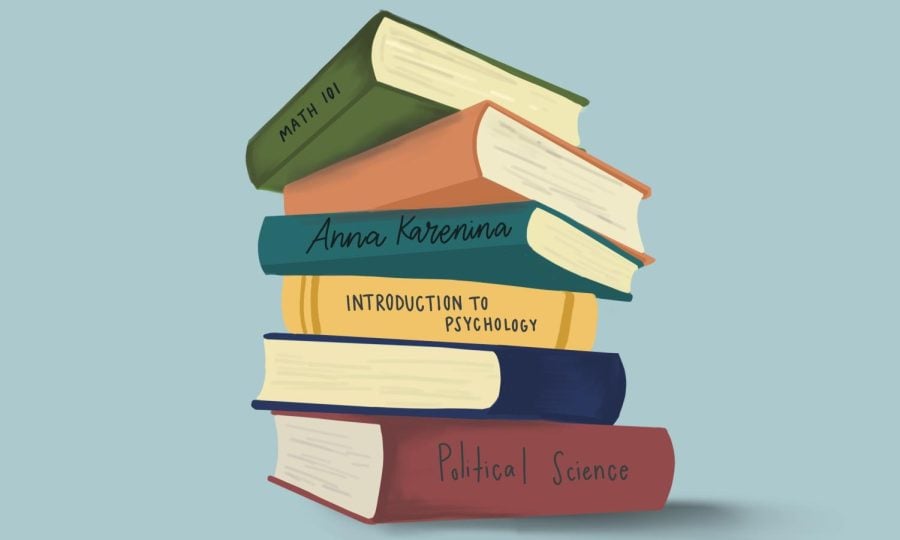Weinberg College to adjust distribution requirements, first-year writing courses beginning fall 2023
Daily file illustration by Emily Lichty
As of fall 2023, the current Literature and Fine Arts distribution requirement will broaden to Literature and Arts.
February 9, 2023
After more than seven years of research and review, Weinberg College of Arts and Sciences is set to adjust its undergraduate degree requirements beginning Fall Quarter 2023.
Incoming undergraduates will be required to complete classes across a set of “foundational disciplines,” as opposed to the current “distribution requirements.” Though the subject areas remain largely the same, each requirement will include a specific set of learning goals.
In a key change, the current “Literature and Fine Arts” requirement will broaden to “Literature and Arts,” allowing students to count classes from the Art Theory and Practice department.
New students will also be required to complete two “overlay” courses, which they can simultaneously apply to other degree requirements: the first is “U.S. Perspectives on Power, Justice and Equity” and the second, “Global Perspectives on Power, Justice and Equity.”
Associate Dean for Undergraduate Academic Affairs Mary Finn said the changes reflect Weinberg’s overarching goal to equip each student to “observe, critique, express, reflect.”
“I think that our students will have a clearer sense of how their degree is about much more than their major,” Finn said. “They should graduate with advanced skills in writing and communication, and they should have had two serious engagements with … curriculum that focuses on issues of justice, power and equity.”
Eight years ago, students petitioned for a U.S.-focused social inequalities and diversity curriculum in Weinberg, such as the new overlay. Finn said the committee added the complementing global course at the suggestion of faculty who had lived, studied and taught abroad.
The process of revising Weinberg requirements began in Winter Quarter 2016, when Weinberg Dean Adrian Randolph assembled an Ad Hoc Committee on Degree Requirements to review the current policies and survey faculty on potential changes. After more than a year of regular meetings, the committee submitted its final report in September 2017, proposing the foundational disciplines, overlays and a revisited writing requirement.
As part of the revised writing requirement, Fall Quarter first-year seminars will no longer require instructors to formally assess students’ writing skills at the end of the course.
Instead, students will take a first-year seminar of their choice, followed by a more writing-intensive seminar in the winter or spring quarters of their freshman year. This change aims to reduce the number of learning goals hinging on the Fall Quarter first-year seminar, according to the committee’s final report.
Faculty in the Cook Family Writing Program will spearhead developing and teaching these courses, according to the report. The seminars may also allow English Department graduate students to gain additional teaching experience.
“A noteworthy reaction to this proposal was that the proposed first-year seminar structure shifts primary responsibility for the writing-intensive first-year seminars from departments and programs to the Writing Program,” the report stated. “This was viewed by some as ceding intellectual ownership and potentially treating writing as an isolated form of competence.”
Comparative literature Prof. Peter Fenves said while the subject areas seem largely the same among the foundational disciplines, he was initially concerned by the reframing of distribution requirements as “foundational.”
Fenves added that separating the subject areas into distinct disciplines seemed to contradict Weinberg’s interdisciplinary nature.
“Foundational … doesn’t seem to me to be a chord with a lot of the ways in which professors here understand what they’re doing with students, even in the classes basically oriented towards very-beginning students in that field,” Fenves said. “In studying something like literature or art, if you are competent in the language, anyone can step into the most advanced writing or art.”
Email: [email protected]
Twitter: @maiapandey
Related Stories:
— Professors reflect on newly-tenured status following pandemic-affected academic years
— A guide to coursework at Northwestern
— The Weinberg requirements might change. Here’s what you need to know


